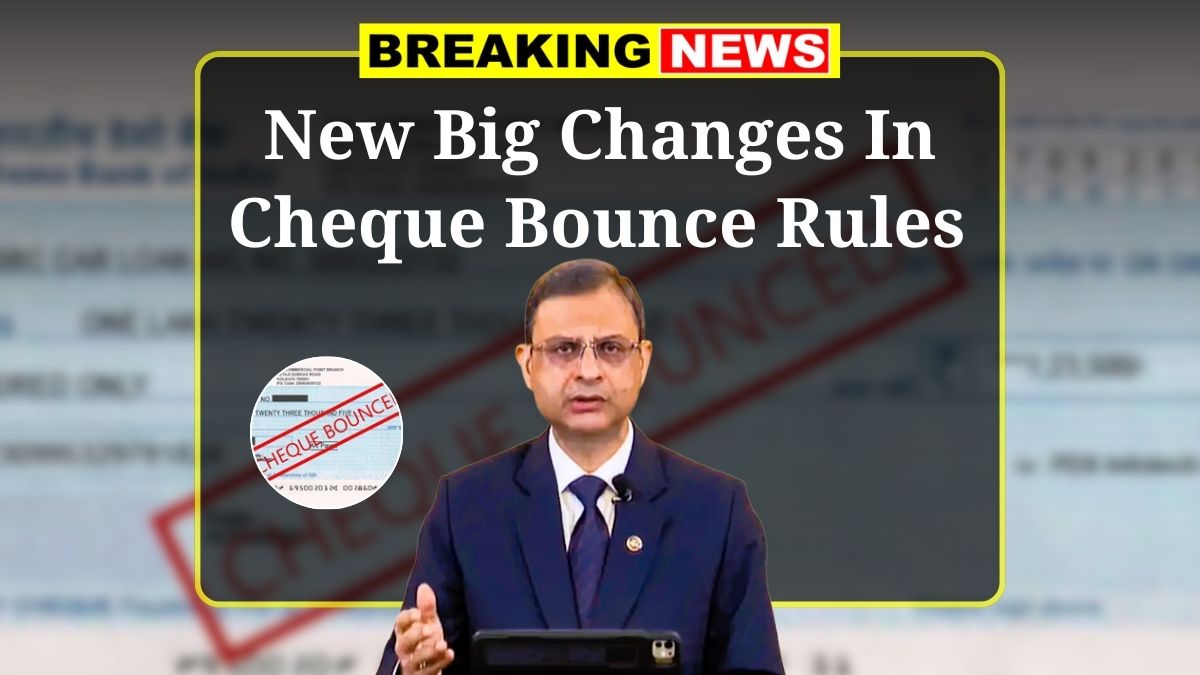Cheque Bounce Rules – Starting in 2025, cheque bounce cases in India will follow stricter and more streamlined guidelines introduced by the Reserve Bank of India (RBI). The aim of these new changes is to curb fraud, speed up dispute resolution, and improve financial discipline across the country.
Whether you’re a business owner or an individual who regularly deals with cheques, it’s essential to understand these updates to avoid penalties, legal trouble, and potential blacklisting. Here’s what’s changing and what you need to do to stay compliant.
Understanding Cheque Bounce and Why It’s Changing
A cheque bounce happens when a bank refuses to process a cheque, often due to reasons like insufficient funds, signature mismatches, or outdated dates. Under the Negotiable Instruments Act, specifically Section 138, cheque bounce is a criminal offense and can result in fines, imprisonment, or both. Common causes for cheque bounces include insufficient funds, a mismatch in signatures, stale or post-dated cheques, errors or overwriting on the cheque, and closed or frozen accounts.
To address these issues and streamline how such disputes are handled, the RBI and Ministry of Finance have updated the cheque bounce rules, which will come into effect nationwide on January 1, 2025. The new rules aim to bring more transparency, reduce fraud, and ensure faster resolution of issues.
What Are the Major Updates in the New Rules?
The new guidelines introduce several important changes that will affect both cheque issuers and recipients. First, both parties will now receive instant alerts via SMS or email whenever a cheque is dishonoured. This is a significant step forward from the previous, slower communication process.
Additionally, banks will now automatically impose penalties on those who issue bounced cheques, even for minor errors. Repeat offenders will also be reported to credit bureaus like CIBIL, potentially damaging their credit score. Legal cases related to cheque bounces must now be resolved within 90 days, a sharp contrast to the old system, where cases could drag on for months or even years.
For repeat offenders, there may be a ban on issuing cheques for a period of 6 to 12 months. Furthermore, the new rules introduce a system for digital image verification of signatures and cheque amounts, making it easier to authenticate cheques. For high-value cheques (above ₹1 lakh), the matter will automatically be reported to regulatory authorities, ensuring quicker oversight and resolution.
Comparison of Old vs. New Rules
The changes are significant when compared to the old system. Previously, penalties for bounced cheques were left to the discretion of the bank, and legal resolutions could take anywhere from 6 months to several years. Under the new rules, banks are required to impose mandatory penalties, and legal disputes must be resolved within 90 days.
In the past, communication about bounced cheques was often delayed, but now both parties will receive real-time alerts. Furthermore, repeat offenders will be reported to credit agencies, and automatic regulatory oversight will apply to high-value cheques.
Who Will Be Most Affected by the New Rules?
The new regulations will impact various groups, especially those who frequently deal with cheques. Small businesses that rely on post-dated cheques for transactions may face increased risks. Freelancers and service providers who accept cheques as payment, landlords who collect rent via cheques, and individuals who regularly issue cheques with low balances will also need to be extra cautious. These groups should take extra steps to ensure they follow the new rules and avoid accidental violations.
What Should You Do to Avoid Legal Issues?
To avoid falling into legal or financial trouble under the new rules, there are a few precautionary steps you can take. First, always maintain a minimum balance in your account before cheque clearance dates. Double-check the details on the cheque, such as the date, name, and amount, and make sure that everything is correct.
Also, avoid issuing post-dated or stale cheques and make sure your signature is updated with the bank. Whenever possible, opt for digital payments instead of cheques. Finally, stay on top of SMS and email alerts from your bank to monitor the status of your cheques.
Legal Penalties for Bouncing a Cheque in 2025
The consequences of cheque bounce cases will be much more serious from 2025. Penalties could include a fine of up to twice the value of the cheque, imprisonment for up to 2 years, and reporting to credit bureaus, which will negatively affect your credit score. Banks will charge penalties ranging from ₹500 to ₹2,500 for each instance of a bounced cheque. In severe cases, a civil suit could be filed, and property could be attached to recover the amount.
The cheque bounce rule changes coming into effect in 2025 are designed to bring more transparency and efficiency to India’s financial system. The updated guidelines aim to reduce fraud, speed up resolutions, and make the payment system more accountable. To avoid facing penalties or legal issues, individuals and businesses that still rely on cheque payments must adapt to these new regulations as soon as possible. With real-time alerts, automatic penalties, and mandatory reporting, even a small mistake can lead to serious consequences.
Disclaimer
Also Read:
 Landlord Rights : Big Relief for Property Owners – Court Ends Forced Occupation by Tenants
Landlord Rights : Big Relief for Property Owners – Court Ends Forced Occupation by Tenants
The information provided above is intended for general guidance and educational purposes. Always consult with legal or financial experts for specific advice on how the changes to cheque bounce rules may affect your situation.




